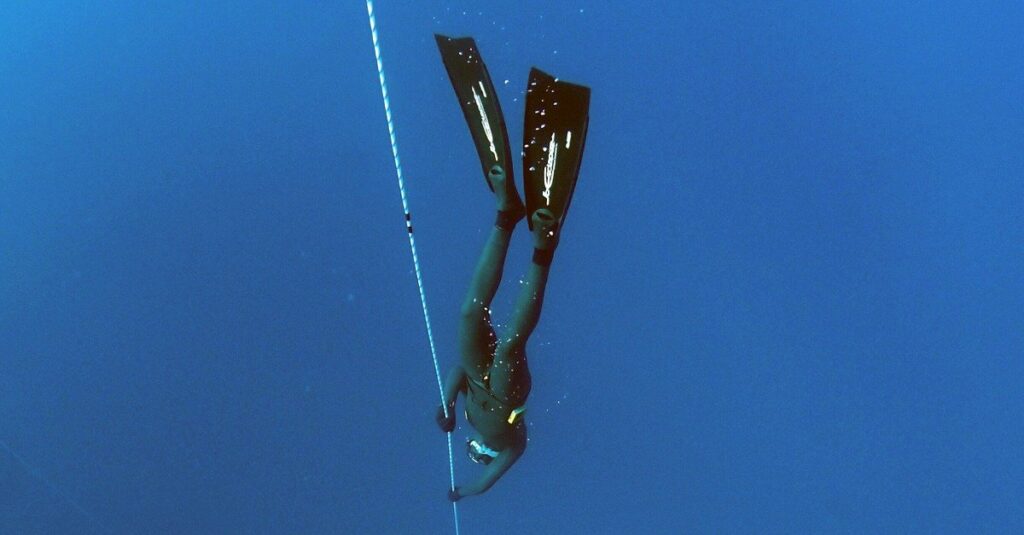

30 feet should not be a challenging depth for freedivers who are properly trained in breath-hold techniques and freediving safety, and are diving with a buddy. If you are medically fit and have completed a course of freediving instruction, then you may be able to freedive 30 feet.
The deepest freedive was a 253 m (830 ft) “no limits” freedive, accomplished by Herbert Nitsch in 2012. It is certainly possible for many divers to freedive 30 feet (around 9.1 meters). Beginner freediver courses may involve reaching diving depths of 10-15 meters (about 32.5-49 feet).
The True Story Book of Freediving Champion Audrey Mestre and the Story of Her Death
View on Amazon: The Last Attempt (Opens new tab)


Top rated read
This article tells you more about freediving to 30 feet and what you should know about freediving to this depth, as well more information about deeper freedives and the deepest possible freediving depth.
Is 30 feet a deep dive?
30 feet would not normally be considered a particularly deep dive. Beginner freediving courses may teach people to freedive safely at depths up to 10-15 meters, equivalent to 32.5 – 49 feet.
At 30 feet underwater, you will experience the physical sensations and effects of increased water pressure, which at this depth will be almost double atmospheric pressure at sea level. 30 feet is deep enough to practice important freediving techniques including breath-holding and equalizing the pressure in your ears.
NB Even at shallower depths, you should ensure that you have a freediving buddy in case of blackout in the water.
For more information about freediving depths, check out our article on how deep freedivers typically dive (opens new tab).
Can you get the bends from diving 30 feet?
While it is possible to get decompression sickness (DCS), also known as “the bends”, from freediving, this is highly unlikely to happen while diving to a depth of 30 feet. The bends is more common in scuba diving where divers are breathing in compressed air or another oxygen-rich gas mixture.
DCS is a condition which can cause pain, internal injury, and death. It occurs when nitrogen gas dissolved in the blood under the high water pressures of a diving descent is released from the blood too quickly as the diver ascends.
A slower return to the surface allows nitrogen to dissolve gradually and safely out of blood and body tissue. When divers ascend too fast, the pressure on their body reduces too quickly and dissolved nitrogen gas is released in bubbles which can cause painful and dangerous blockages throughout the body. These bubbles can lead to ruptured blood vessels in the lungs, a heart attack, or a stroke.
What’s the deepest you can freedive?
The deepest freedive in the Guinness Book of Records was a 253 m (830 ft) “no limits” freedive, by Herbert Nitsch in Santorini, Greece, in 2012. Nitsch experienced DCS after this extremely deep dive.
In the no limits category of freedive, divers can descend using whatever means they wish, including weights or a sled. This allows them to go far deeper than descending solely with their own efforts.
There are other categories of freediving apart from no limits. In constant weight freediving, a diver must descend and ascend using only bi-fins or a monofin, without touching the dive line, using weights of any sort, or doing anything to change their own weight. The deepest constant weight dive by a male freediver was 130 m (426 ft 6 in), and 114 metres (374 ft) by a female diver.
In variable weight freedives, a diver is allowed to change their weight as the dive proceeds and to assist themselves using the dive line. This allows them to be heavier on the way down and lighter on the ascent. For “variable weight freediving, the record is 150 m (492 feet 1 inch) for men and 130 m (426 ft 6 in) for women.
References
https://www.guinnessworldrecords.com/search?term=freediving&page=1&type=all&max=20&partial=_Results&
https://www.guinnessworldrecords.com/world-records/673884-deepest-no-limit-freedive-male
https://www.herbertnitsch.com/freediver.html
https://www.cmas.org/apnoea/about-2012032621
https://www.deeperblue.com/decompression-and-freediving-what-are-the-real-risks/
